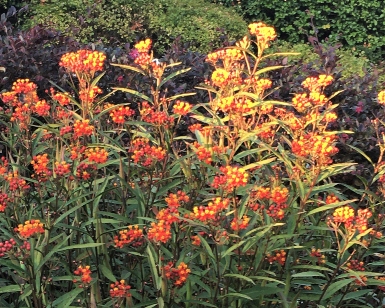San Rafael, CA – Nurseries and retail centers in Marin County are now prohibited from selling tropical milkweed, a variety not native to the area and harmful to monarch butterflies.
 Sales of tropical milkweed are banned in Marin, but those with tropical milkweed growing in their gardens do not need to remove them. (Photo by Alice Cason)
Sales of tropical milkweed are banned in Marin, but those with tropical milkweed growing in their gardens do not need to remove them. (Photo by Alice Cason)Marin County Agricultural Commissioner Stefan Parnay issued a memo to the local retail centers August 24 to prohibit the sales of the non-native plants on the heels of the California Department of Food and Agriculture designating tropical milkweed as a B-rated weed. Such weeds are rated as pests that do not meet state cleanliness standards. Parnay directed all retailers to remove and destroy all tropical milkweed in stock.
In July, the International Union for Conservation of Nature designated monarch butterflies as endangered. The recorded monarch population in the Bay Area, which migrates from central Mexico, has declined by more than 80% since the 1990s. The decrease is tied to climate change, pesticides, disease, and habitat loss. Monarchs depend on milkweed to complete their life cycle; the plants are the only ones on which the butterflies will lay eggs and are the sole source of food for their caterpillars.
“We want to thank the nursery staffs for their understanding and assistance in helping us protect the monarch butterflies,” Parnay said. “Their customers can play an important role by buying native milkweeds and native nectar plants that will improve the health of pollinators. Planting native plants is the way to go.”
Unlike native milkweed species, tropical milkweed does not die back in winter, which can confuse monarchs into breeding when they should be migrating. Tropical milkweed is also a host plant to a protozoan parasite of monarchs called Ophryocystis elektroscirrha, or OE. Spores are carried on adult monarchs as they migrate, and the dormant OE spores are deposited on the tropical milkweed leaves. As the monarch caterpillars eat the plant, they ingest the OE spores and become infected. Such infections have been linked to lower migration success, reduction in body mass, lifespan, mating success, and flight ability.
Butterfly lovers who have already planted tropical milkweed in their gardens don’t have to tear the plants out. Marin County Director of the UC Cooperative Extension David Lewis recommends homeowners contact the UC Marin Master Gardener Help Desk for more information by calling (415) 473-4910 or emailing HelpDesk@marinmg.org. The Master Gardener help desk is a garden problem-solving and information resource for all Marin residents.
Lewis recommended that existing tropical milkweed stalks be pruned to about 6 inches in height during the fall to encourage monarchs to resume their migration and help eliminate OE spores on the plants. Over time, the tropical milkweed can be replaced with native milkweed species as they become more readily available.
Native plantings in yards and gardens provide habitat that supplements the resources butterflies can find in Marin’s open spaces. Marin County Parks is working with One Tam, a partnership of Marin’s public land managers, to survey parks and preserves for naturally occurring milkweed. Biologists and community scientists are visiting natural lands throughout the county to track the health of native milkweed locations. These surveys and future actions to improve overwintering groves and wild milkweed breeding habitat are funded by a $400,000 Wildlife Conservation Board grant with an additional $368,000 in matching funds from One Tam partner agencies.
Parnay’s office is coordinating with the Marin Master Gardener program, Marin County Parks, and the Marin Monarch Work Group to co-host a native milkweed plant give-away event next spring. The collaborating agencies are hoping to receive donations of native plants from a foundation that supports monarch habitats.